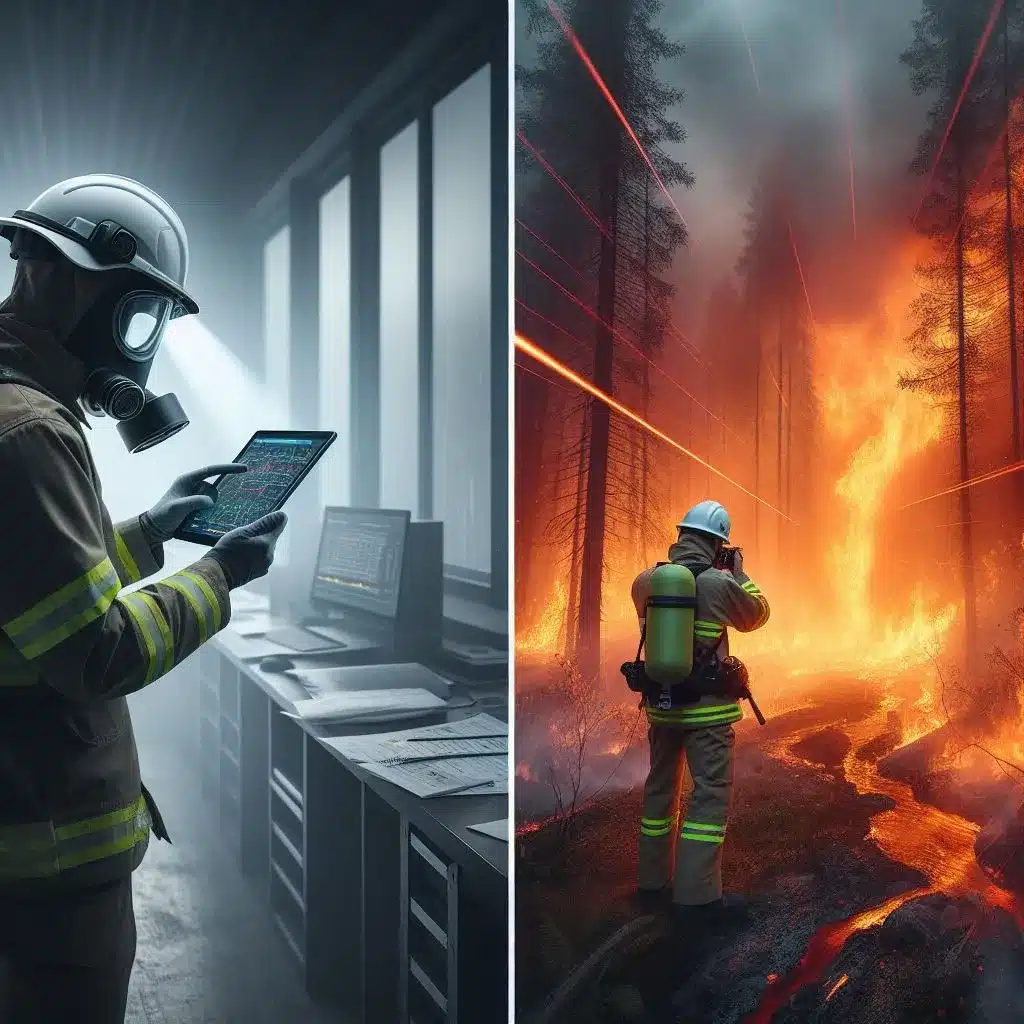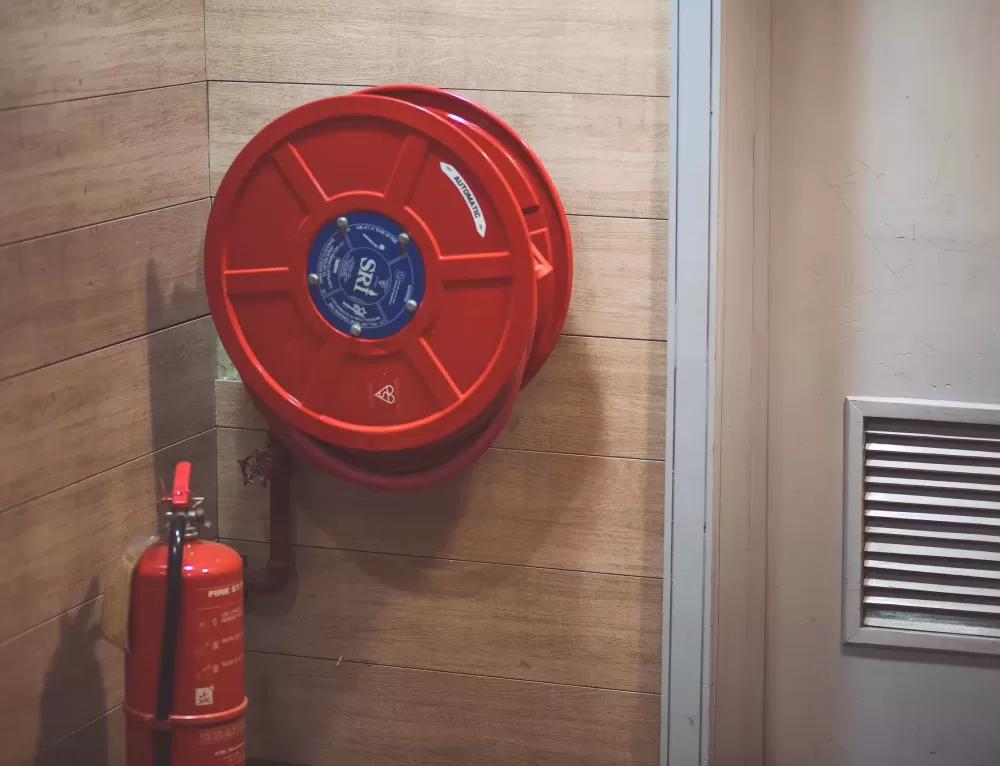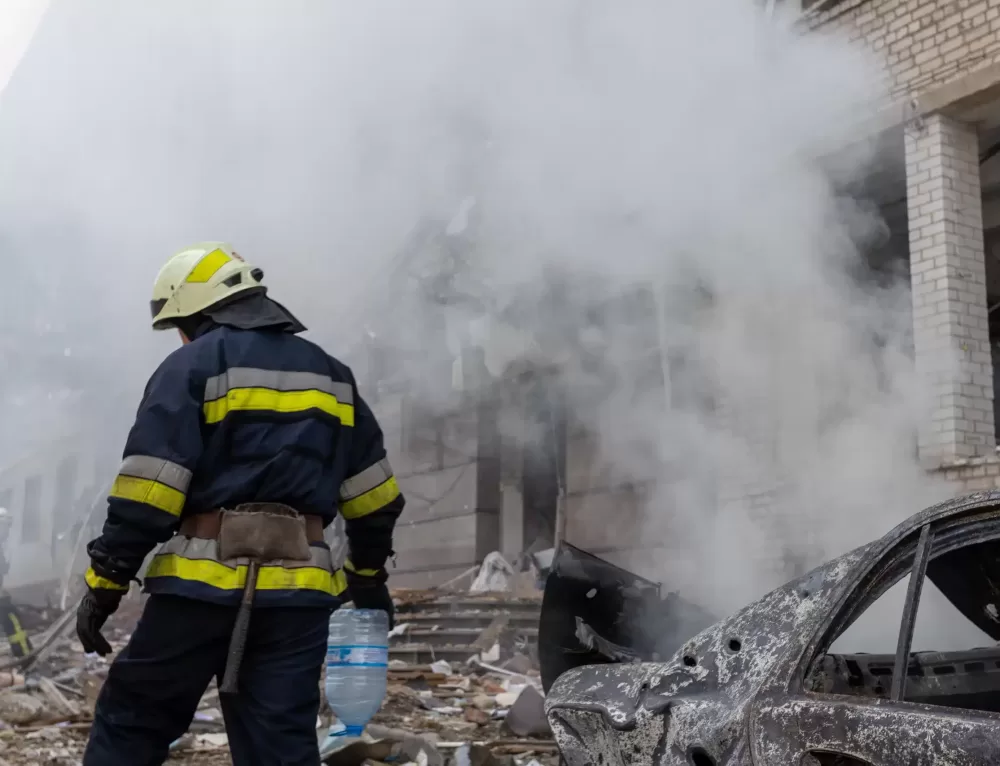When it comes to fire safety, prevention is always better than cure. That’s where a fire consultant comes in. With their expertise and experience, these professionals play a crucial role in identifying potential fire risks and implementing effective prevention strategies.
A fire consultant is trained to conduct comprehensive risk assessments of various types of properties, including commercial buildings, residential complexes, and industrial facilities. They meticulously evaluate factors such as fire hazards, electrical systems, emergency exits, and fire safety protocols to determine areas of vulnerability. By identifying potential risks, they can then recommend practical measures to mitigate these risks and prevent disasters.

Fire consultants also ensure that all necessary fire safety regulations and codes are being followed. They keep themselves updated with the latest industry standards and best practices, providing valuable insights to property owners and managers. This helps create a safer environment for occupants and safeguard against the devastating consequences of fires.
By enlisting the services of a fire consultant, property owners and managers can proactively address fire risks, enhance safety measures, and gain peace of mind, knowing that they have taken every possible step to prevent disasters.
So, if you want to protect your property and the people within it, consulting a fire expert is undoubtedly a wise investment.
The role of a fire consultant
A fire consultant plays a critical role in ensuring the safety of a property and its occupants. They possess specialized knowledge and skills that enable them to identify potential fire risks and develop effective prevention strategies. Here’s a closer look at the key responsibilities of a fire consultant.
First and foremost, a fire consultant conducts thorough risk assessments of various properties. This involves evaluating factors such as fire hazards, emergency exits, electrical systems, and fire safety protocols. By identifying potential risks, they can recommend appropriate measures to mitigate these risks and prevent disasters.
In addition to risk assessments, fire consultants also ensure that all necessary fire safety regulations and codes are being followed. They stay updated with the latest industry standards and best practices, providing valuable insights to property owners and managers. This helps create a safer environment for occupants and mitigates the devastating consequences of fires.
Moreover, a fire consultant plays a crucial role in emergency planning and evacuation procedures. They help develop and implement effective emergency response plans, ensuring that occupants can evacuate safely in the event of a fire. This includes conducting fire drills, training staff on fire safety protocols, and reviewing evacuation routes.
In summary, a fire consultant is responsible for conducting risk assessments, ensuring compliance with fire safety regulations, and developing emergency response plans. Their expertise and knowledge are essential in preventing fires and minimizing the potential damage they can cause.
Understanding potential fire risks
To effectively prevent fires, it is essential to understand the potential fire risks that exist in various environments. Different industries may have unique fire hazards that require specific prevention strategies. Here are some common fire hazards in different industries and the measures that fire consultants can recommend to mitigate these risks.
In the hospitality industry, fire hazards can include faulty electrical systems, improper storage of flammable materials, and inadequate fire suppression systems. Fire consultants can recommend installing fire-resistant materials, conducting regular electrical inspections, and implementing strict storage protocols for flammable substances.
In manufacturing facilities, fire risks may arise from machinery malfunctions, combustible dust, and improper handling of hazardous materials. Fire consultants can suggest implementing regular equipment maintenance, installing proper ventilation systems, and providing comprehensive training on the safe handling of hazardous materials.
Commercial buildings, such as office spaces and shopping centers, may have fire risks associated with overcrowding, inadequate fire detection systems, and blocked emergency exits. Fire consultants can recommend conducting regular inspections to ensure compliance with occupancy limits, installing state-of-the-art fire detection and suppression systems, and implementing clear signage for emergency exits.
In residential complexes, fire risks can include faulty wiring, unattended cooking appliances, and inadequate smoke alarms. Fire consultants can advise on the importance of regular electrical inspections, promoting fire safety awareness among residents, and installing interconnected smoke alarms for early detection of fires.
Understanding these potential fire risks and implementing the recommended prevention strategies can significantly reduce the likelihood of fires and ensure the safety of people and properties.
Common fire hazards in different industries
Fires can occur in any industry, but certain sectors are more prone to specific fire hazards. For example, in the hospitality industry, kitchens and restaurants pose a higher risk due to the presence of open flames and flammable materials. In manufacturing facilities, the use of machinery and chemicals increases the likelihood of fires. Even office spaces can be at risk due to faulty electrical equipment or improper storage of combustible materials.
To effectively prevent fires, a fire consultant first needs to identify the common hazards associated with the specific industry. This involves conducting a thorough assessment of the property, examining potential ignition sources, fuel sources, and oxygen sources. By understanding the unique risks faced by each industry, fire consultants can tailor their prevention strategies accordingly.
It is important to note that fire hazards can vary within industries as well. For example, in the healthcare sector, the risk of fire is higher in operating theaters due to the presence of flammable anesthetic gases and oxygen-rich environments. Fire consultants pay attention to these nuances and develop targeted solutions to mitigate the risks.
In addition to industry-specific hazards, there are also common fire risks that exist across all sectors. These include electrical faults, inadequate fire suppression systems, poor housekeeping practices, and lack of employee training. By addressing these common risks, fire consultants ensure a comprehensive approach to fire prevention.
Fire prevention strategies
Once the fire hazards have been identified, fire consultants work closely with property owners and managers to develop effective prevention strategies. These strategies typically involve a combination of engineering controls, administrative controls, and employee training.
Engineering controls focus on physical modifications to the property to reduce fire risks. This can include installing fire-resistant materials, implementing automatic fire suppression systems, improving ventilation, and ensuring that emergency exits are easily accessible. By incorporating these measures, the likelihood and severity of fires can be significantly reduced.
Administrative controls involve the implementation of policies, procedures, and protocols to enhance fire safety. This can include regular maintenance of electrical systems, conducting fire drills, establishing clear evacuation plans, and ensuring that fire safety equipment is in good working condition. Fire consultants provide guidance on developing these controls, ensuring they are aligned with industry regulations and best practices.
Employee training is another critical aspect of fire prevention. Fire consultants emphasize the importance of educating employees on fire safety protocols, evacuation procedures, and the proper use of fire extinguishers. By empowering employees with the knowledge and skills to respond effectively in case of a fire, the risk to life and property can be significantly reduced.
It is worth mentioning that fire prevention strategies are not one-time fixes. Fire consultants encourage regular reviews and updates to ensure that prevention measures remain effective as the property and its operations evolve over time.
Conducting fire risk assessments
The cornerstone of effective fire prevention is a comprehensive fire risk assessment. Fire consultants are trained to conduct these assessments to identify potential fire hazards and vulnerabilities. This involves a systematic evaluation of the property, taking into account various factors that can contribute to fires and their spread.
During a fire risk assessment, fire consultants thoroughly inspect the property, examining its layout, construction materials, electrical systems, and storage practices. They also assess the adequacy of fire protection systems, such as fire alarms, sprinklers, and fire extinguishers. By conducting these assessments, fire consultants can identify potential ignition sources, fuel sources, and oxygen sources, as well as any deficiencies in the fire safety measures already in place.
In addition to physical inspections, fire consultants also review documentation related to fire safety, such as maintenance records, emergency response plans, and employee training logs. This comprehensive approach ensures that no potential risks are overlooked.
Based on the findings of the assessment, fire consultants provide property owners and managers with a detailed report outlining the identified risks and recommended measures to mitigate them. These recommendations may include modifications to the property, improvements to fire safety systems, and the implementation of additional training and emergency response protocols.
Fire safety regulations and compliance
Fire safety regulations and compliance are essential for ensuring the safety of occupants and protecting properties from the devastating consequences of fires. Fire consultants play a crucial role in helping property owners and managers understand and adhere to these regulations.
Fire consultants keep themselves updated with the latest fire safety codes and regulations, ensuring that their recommendations align with legal requirements. This knowledge is invaluable to property owners and managers, as non-compliance can result in fines, penalties, and even legal liabilities in the event of a fire.
Moreover, fire consultants assist in obtaining the necessary permits and certifications required by regulatory bodies. They guide property owners and managers through the process, ensuring that all necessary inspections are conducted and documentation is in order. This proactive approach demonstrates a commitment to fire safety and minimizes the risk of non-compliance.
By working with fire consultants, property owners and managers can have peace of mind knowing that their properties meet the required fire safety standards and are in compliance with regulations. This not only protects the occupants but also reduces the risk of costly property damage and legal repercussions.
Importance of emergency planning and evacuation procedures
In the event of a fire, having a well-defined emergency plan and efficient evacuation procedures can mean the difference between life and death. Fire consultants emphasize the importance of emergency planning and work closely with property owners and managers to develop effective emergency response protocols.
Emergency planning involves identifying safe evacuation routes, establishing assembly points, and designating responsible individuals to coordinate the evacuation. Fire consultants ensure that emergency exits are clearly marked, easily accessible, and free from obstructions. They also consider the needs of individuals with disabilities or special requirements, ensuring that they are included in the emergency plan.
Regular fire drills and training sessions are conducted to familiarize occupants with the emergency procedures. Fire consultants provide guidance on how to respond to alarms, safely evacuate the building, and perform basic fire suppression techniques if necessary. By practicing these procedures, occupants can react quickly and effectively in the event of a real fire.
It is important to note that emergency planning is not a one-size-fits-all approach. Fire consultants tailor the plans to the specific property and its occupants, taking into account factors such as building size, occupancy type, and the presence of hazardous materials. This customized approach ensures that the emergency plan is practical and effective.
Training and education for fire safety
Fire safety is a shared responsibility that extends beyond the expertise of fire consultants. To create a safe environment, it is essential to invest in ongoing training and education for all occupants of a property.
Fire consultants emphasize the importance of providing regular fire safety training to employees, residents, and other occupants. This training covers topics such as fire prevention, emergency response procedures, and the proper use of fire safety equipment. By equipping individuals with the knowledge and skills to prevent fires and respond appropriately, the overall safety of the property is greatly enhanced.
Fire consultants also encourage property owners and managers to promote a culture of fire safety. This can include displaying fire safety signage throughout the property, organizing fire safety awareness campaigns, and regularly communicating fire safety reminders. By fostering a fire-conscious environment, the likelihood of accidents and fires caused by human error can be significantly reduced.
Furthermore, fire consultants emphasize the importance of continuous learning and staying up to date with the latest fire safety practices and technologies. They provide guidance on industry resources, training programs, and certifications that can further enhance knowledge and skills in fire prevention and emergency response.
Conclusion: The importance of proactive fire prevention measures
In conclusion, fire safety is a critical aspect of any property, and prevention is always better than cure. By enlisting the services of a fire consultant, property owners and managers can proactively identify potential fire risks and implement effective prevention strategies.
Fire consultants play a vital role in conducting comprehensive risk assessments, recommending practical measures for risk mitigation, and ensuring compliance with fire safety regulations. Their expertise and experience help create a safer environment for occupants and safeguard against the devastating consequences of fires.
Consulting a fire expert brings numerous benefits, including proactive fire prevention, enhanced safety measures, compliance with regulations and codes, and expert guidance and support. Investing in the services of a fire consultant is undoubtedly a wise investment for property owners and managers who prioritize the safety and well-being of their occupants.
So, if you want to protect your property and the people within it, consulting a fire expert is the first step towards a safer and more secure environment. Take action today and ensure that you have taken every possible step to prevent disasters.





